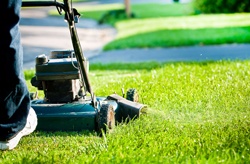Video: Grass In the Streets Feeds Algae In the Lakes

Keeping grass clippings out of our streets is an important step to keeping algae out of our lakes. The storm sewer connects streets to Plymouth’s lakes, streams and wetlands. That means that whatever is in the street ends up in one of these water resources.
Grass clippings are rich with phosphorus, a nutrient that feeds algae. With lawns dominating much of Plymouth’s landscape, grass clippings left in the street can become a real threat to our lakes, wetlands and streams.
Simple steps can go a long way to solve the problem. Mulching or blowing grass clippings onto the lawn – either during or after mowing – is the easiest way to keep them in place. This keeps the phosphorus on the lawn, feeding the grass instead of the algae. If the grass gets too long to mulch it can be bagged for composting, either at home or commercially.
Plymouth is home to eight lakes, several streams and more than 800 wetlands. Simple steps can protect them for years to come.
